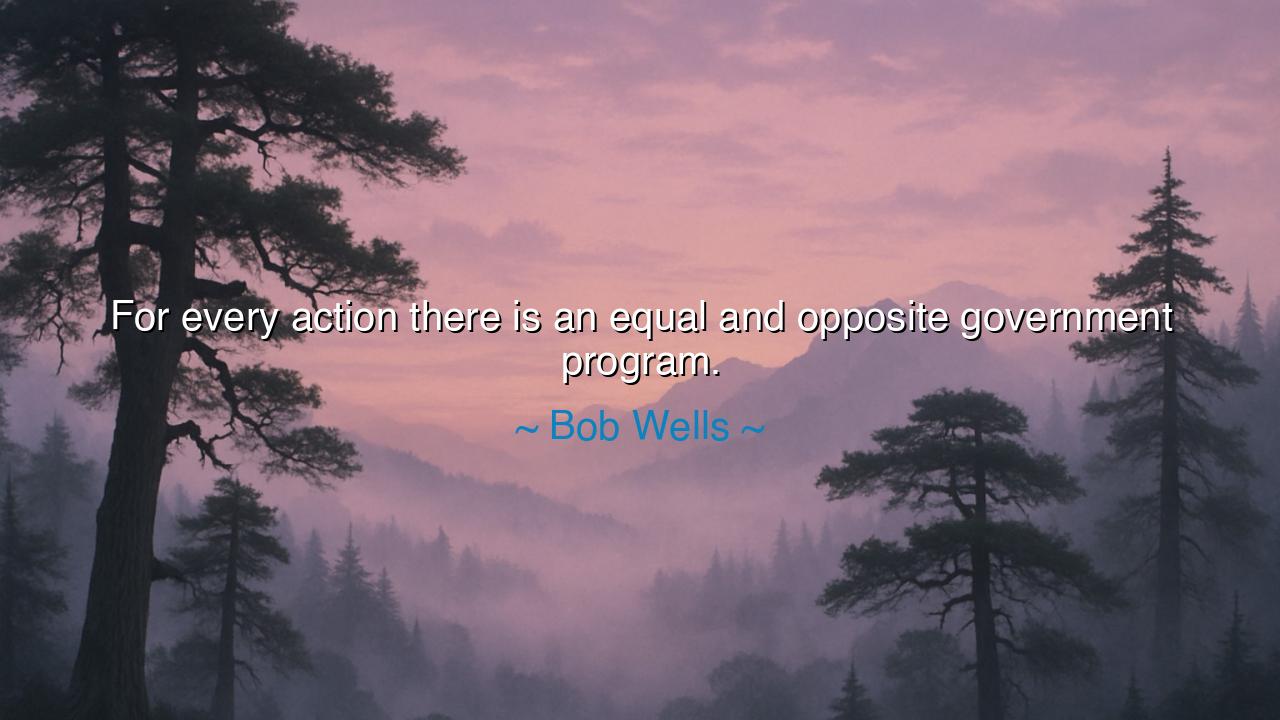
For every action there is an equal and opposite government






In the long and ironic march of human governance, the humorist and observer Bob Wells once cast a sharp light upon the nature of power and bureaucracy when he said:
"For every action there is an equal and opposite government program."
At first hearing, these words seem playful — a jest drawn from Newton’s law of motion — yet beneath their humor lies a profound commentary on the tendency of governments to complicate what they seek to solve. Wells’s wit conceals a deep frustration known to all who have lived under systems of policy and administration: that every attempt by government to correct an ill often births another, equal in magnitude, opposite in purpose, and costly in both treasure and trust. His words are the lament and laughter of the people, who watch as bureaucracy, like an ocean tide, advances upon every shore of life — with noble intent perhaps, but often clumsy execution.
The meaning of this quote lies not in cynicism, but in the recognition of human limitation. Governments, born of good intentions, often create programs to address social or economic problems — poverty, hunger, education, industry. Yet the machinery of the state is vast, slow, and filled with conflicting interests. Thus, a law meant to feed the poor may create dependence; a subsidy to boost industry may encourage corruption; a regulation to ensure safety may smother innovation. The “equal and opposite” nature of these outcomes reflects the truth that every intervention carries unintended consequences. Bob Wells reminds us that wisdom in governance lies not in doing more, but in understanding the delicate balance between help and harm.
The origin of this insight comes from the observation of twentieth-century America — an age of expanding government and social experimentation. After the Great Depression, wars, and social upheavals, the state grew to meet every challenge, often with admirable resolve. But as programs multiplied, so too did inefficiency and contradiction. One hand of government gave what the other took away. To farmers, it paid to grow; to markets, it paid to destroy surplus. To industry, it offered loans; to consumers, it offered debt relief. Each policy created a counter-policy, and soon the people found themselves entangled in a web of laws so dense that even justice itself could lose its way. Wells’s quote arose from that recognition — that power, when overextended, becomes its own contradiction.
History, too, offers countless examples of this truth. Consider the tale of the Roman Empire, whose administrators, in their zeal to control every trade and tax, created an edifice so bloated that it consumed its own vitality. They imposed regulations upon regulations, prices upon prices, until commerce slowed and citizens turned from labor to dependency. The emperors sought to restore prosperity through decree — yet each decree deepened decay. Thus the empire, mighty in law but weak in wisdom, fell beneath the weight of its own governance. So it has been in many lands: the more power reaches to cure, the more it risks corrupting the very freedom and vitality it seeks to protect.
Yet the wisdom of Bob Wells is not a call to anarchy, but to humility. He does not say that government is evil, only that it must remember its limits. For governance is like fire — a servant when contained, a destroyer when uncontrolled. A good government, like a good physician, must act with restraint, knowing that every remedy carries risk. The art of leadership is not to impose endless correction, but to cultivate responsibility in the people themselves. When citizens are strong, the need for programs diminishes; when citizens grow passive, the programs multiply like vines, choking the tree of liberty they were meant to nourish.
The humor of the quote also serves a higher purpose: it frees the people from despair by turning frustration into laughter, and laughter into reflection. To see the folly of bureaucracy is not to lose faith in society, but to awaken to its complexity. Every citizen, every leader, should heed Wells’s lesson: that policy without prudence becomes parody. The task, therefore, is not to reject all government action, but to demand that every action be guided by clear purpose, measurable results, and moral restraint.
So let this teaching be remembered in the councils of power and the hearts of the governed: every act of governance must be weighed not only by its intention, but by its consequence. Let rulers be wise enough to do less, and citizens strong enough to do more for themselves. For the balance between liberty and order is delicate — and when one grows too heavy, the other is crushed.
Thus ends the teaching: learn to see the comedy in the follies of power, but never cease to demand its correction. For laughter may reveal the truth more sharply than anger ever could. And in the wisdom of that laughter, we find the enduring truth of Bob Wells’s words — that in the great theater of governance, every action invites its opposite, and only through vigilance and virtue can the scales of justice remain in balance.






AAdministratorAdministrator
Welcome, honored guests. Please leave a comment, we will respond soon